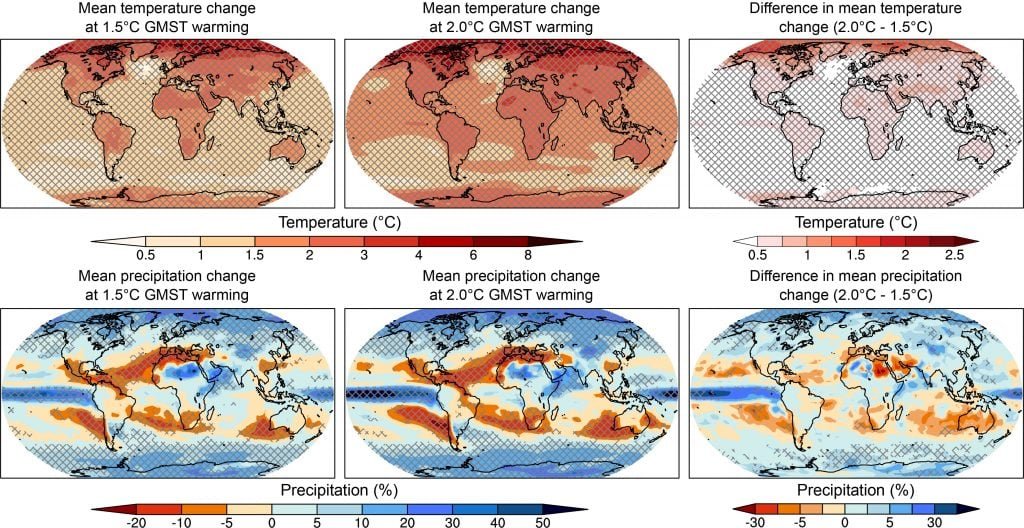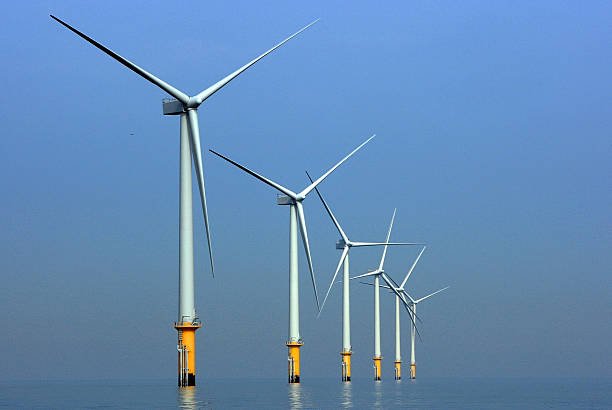IPCC Climate Change Report: Summary & Key Articles
The UN’s Intergovernmental Panel on Climate Change (IPCC) Report, which was just released on March 20, contains 5 years of reports and provides world leaders with a “gold-standard summation of modern climate science”. The TBG Purpose team, which helps SMEs/SMBs, global corporations and institutions to achieve their sustainability goals, has curated a number of key articles below to help you navigate the report.
The IPCC Climate Change Report, which is the first comprehensive report from IPCC since the 2015 Paris Agreement, notes that there is now a 50-50 chance that the world will warm by more than 1.5 degrees Celsius over the next five years. U.N. Secretary-General António Guterres said on Monday: “Today’s IPCC report is a how-to guide to defuse the climate time bomb. It is a survival guide for humanity.” At the same time, the report outlines a number of key solutions. As WEF notes: “The report details 43 cost-effective approaches to limiting global warming to less than 1.5 degrees Celsius. First and third on this list are solar and wind energy, respectively. The second, fourth, and fifth most effective strategies for mitigating carbon emissions are all natural climate solutions (reported within 'agriculture, forestry and other land uses' or AFOLU by the IPCC): ecosystem protection, restoration, and the improved management of farmlands.”
Courtesy: IPCC
World Economic Forum: “Climate change: The IPCC just published its summary of 5 years of reports – here’s what you need to know”
“The Intergovernmental Panel on Climate Change (IPCC) has just launched its latest report on the climate crisis.
The AR6 Synthesis Report: Climate Change 2023 summarizes five years of reports on global temperature rises, fossil fuel emissions and climate impacts.
Here are the main findings of the IPCC report and what needs to happen to limit global warming to below 1.5°C.
The viability of humanity living within planetary boundaries rests on the actions we take in the next seven years. There's no time to lose to keep to the target of limiting the global average temperature to below 1.5°C.
"There is a rapidly closing window of opportunity to secure a liveable and sustainable future for all."
This is the conclusion of the Intergovernmental Panel on Climate Change (IPCC) in its latest report, which sets out to summarize the scientific data on global temperature rises, fossil fuel emissions and the impact of the climate crisis.
The AR6 Synthesis Report: Climate Change 2023 finds that, despite progress in policies and legislation around climate mitigation since the previous such report in 2014, it's "likely that warming will exceed 1.5°C during the 21st century".
This is based on the expected levels of global greenhouse gas (GHG) emissions in the atmosphere by 2030, based on all countries' climate targets – known as nationally determined contributions or "NDCs" – announced as of October 2021.
Limiting warming to "well below 2°C", by 2030, as per the Paris Agreement targets, will be hard to achieve, but avoiding 1.5°C is still possible. The report also lays out the…” (continue article here)
WWF: IPCC Climate Report: 6 key findings about the climate crisis
“The latest science on the state of our climate has been laid out in a powerful new report by the United Nations’ Intergovernmental Panel on Climate Change (IPCC). The Sixth Assessment Report shows how climate change is altering our planet and highlights the many solutions that governments, businesses, cities and individuals can, and must, take to tackle it.
These are the report’s key findings:
The science is super clear: our climate system is in crisis, and it’s because of our actions. Climate change is driven by human activities; primarily burning polluting fossil fuels (coal, oil and gas) and destroying nature. The last time CO2 levels in our atmosphere were this high was over two million years ago. We’ve already warmed the planet by 1.1°C since pre-industrial times, and this is causing dangerous disruption in nature and impacts on people across the world.
And we’re not slowing down. Global greenhouse gas emissions between 2010 and 2019 were higher than any previous decade in human history.
Our climate system is in code red status — The science is super clear: our climate system is in crisis, and it’s because of our actions. Climate change is driven by human activities; primarily burning polluting fossil fuels (coal, oil and gas) and destroying nature. The last time CO2 levels in our atmosphere were this high was over two million years ago. We’ve already warmed the planet by 1.1°C since pre-industrial times, and this is causing dangerous disruption in nature and impacts on people across the world. And we’re not slowing down. Global greenhouse gas emissions between 2010 and 2019 were higher than any previous decade in human history.
Limiting warming to 1.5°C is crucial and we’re way off track — 1.5°C is an important number when it comes to our climate. That’s because impacts beyond 1.5C of warming would get even worse. There would be more frequent and stronger extreme weather events and it would be harder - in some cases impossible - for people and nature to adapt, especially as some changes (like species extinction) are irreversible. Governments across the world agreed to…” (continue article here)
Courtesy: IPCC
Climate Home News: '“The IPCC’s climate scientists have done their job – now we must do ours”
“Today’s report from the IPCC’s climate scientists is attracting headlines for issuing what’s been called a ‘final warning’ on action on climate change and a “clarion call” to massively fast-track climate efforts across every timeframe and country. Buried within it is some crucial guidance for what this means in practice.
The report states that “attention to equity and broad and meaningful participation” can build “social trust” and so “deepen and widen support for transformative changes.”
To put that in non-IPCC language; in climate policy, people matter. The kind of radical social changes supported – demanded – by this report simply won’t happen without the consent and participation of citizens around the world.
But reports, however brilliant, however terrifying, don’t inspire action. That falls to us, as citizens, led by our governments around the world.
For many years, this critical part of the climate change response has been strangely ignored. Socially marginalised and economically vulnerable citizens, and those who…” (continue article here)
The Independent: How to defuse a climate time-bomb: World’s scientists say 1.5C still achievable but ‘humanity on thin ice”
“After five years of meetings, reports and debate, the world’s scientific community has delivered an ultimatum on the climate crisis: “Act now to secure a liveable sustainable future for all.”
The so-called “synthesis report” was published on Monday by the United Nations’ Intergovernmental Panel on Climate Change (IPCC), a body made up of hundreds of international scientists from a dizzying array of disciplines.
It amounts to the most clear-eyed, up-to-date assessment of the climate crisis: how it’s affecting all corners of the world and its systems, and how humanity is faring in its attempts to mitigate disasters and adapt to those that are now unavoidable.
The report is clear that if transformative shifts are made across society to cut planet-heating greenhouse gas emissions this decade, it’s still possible to hold the average global temperature to 1.5C (2.7F). (The world has….)” (continue article here)
The Guardian: “Methane to food waste: eight ways to attempt to stay within 1.5C”
“The Intergovernmental Panel on Climate Change published the “synthesis report” of its sixth assessment report (AR6) on Monday. Eight years in preparation, this mammoth report encompasses the entire range of human knowledge of the climate system, compiled by hundreds of scientists from thousands of academic papers, and published in four parts, in August 2021, February and April 2022, and March 2023.
The report drew together the most important findings – but also highlighted some key measures that governments and countries must take immediately if we are to avoid climate catastrophe:
Reduce Methane — Sharp cuts to short-lived climate pollutants, methane chief among them, could cut more than half a degree from global heating. Produced from oil and gas operations and coalmines, and from animal husbandry and natural sources – such as decaying vegetation – methane is a greenhouse gas about 80 times more powerful than carbon dioxide. But it lasts only for about 20 years before degrading into CO2.
Durwood Zaelke, a peer review scientist for the IPCC’s AR6 report, and founder of the Institute for Governance and Sustainable Development in the US, says cutting it is “the best way to slow near-term warming – indeed the only way we know of, short of [geoengineering through] solar radiation management, carbon dioxide removal and methane removal, all of which are still speculative”.
Cutting it should be easy: the International Energy Agency found that plugging the leaks from fossil fuel operations was not only low-cost but in most cases actively profitable. But many of these operations…” (continue article here)
CNBC: “World’s top climate scientists issue ‘survival guide for humanity,’ call for major course correction
“A landmark U.N. report published Monday urged governments across the globe to embark on an urgent course correction to tackle the climate emergency, warning current plans were insufficient to prevent the worst of what the crisis has in store.
The U.N.’s Intergovernmental Panel on Climate Change said the unprecedented challenge of keeping global warming to 1.5 degrees Celsius above pre-industrial levels had become even greater in recent years due to the relentless increase in global greenhouse gas emissions.
This has resulted in more frequent and more intense extreme weather events that have caused increasingly dangerous impacts on nature and people in every region of the world, the report said.
Deep, rapid and sustained greenhouse gas emission reductions across all sectors will be necessary if warming is to be limited by 1.5 degrees Celsius, the report says, noting that global emissions should already be decreasing and will need to be slashed almost in half by 2030.
The 1.5 degrees Celsius temperature threshold is widely recognized as crucial because so-called tipping points become more likely beyond this level. Tipping points are thresholds at which small changes can lead to dramatic shifts in Earth’s entire life support system.
“Mainstreaming effective and equitable climate action will…” (continue article here)
The Nature Conservancy: 5 Solutions to the Challenges Highlighted in the IPCC Land and Climate Report
“Our extensive modification of the Earth's landscapes is exacerbating climate change and putting both human development and global biodiversity at risk. That’s a major theme of the newly released Special Report on Climate Change and Land, produced by the Intergovernmental Panel on Climate Change (IPCC).
This latest assessment confirms that food security and land-based sectors face mounting risks if business continues as usual, and calls for greater emphasis on land-management decisions in the global effort to address climate change. The report was approved by 195 national governments, but the question remains: will the international community mobilize the political will needed to tackle the imminent threats facing nature and people?
The IPCC estimates that more than 70 percent of Earth’s ice-free lands have been altered by human activity, with 25 percent in a state of degradation. The expansion of land-use sectors— particularly farming and forestry—has contributed to the rapid loss of natural ecosystems and biodiversity. Greenhouse gas emissions associated with the land-based food systems alone emit between 21 and 37 percent of total anthropogenic GHG emissions, and that will likely rise if populations, incomes and consumption patterns grow as expected.
These conditions pose a serious threat to human lives and livelihoods. The IPCC reports that rising temperatures, changing precipitation patterns and more frequent extreme weather are already destabilizing the global food supply. The new report projects median cereal prices could increase by 7.6 percent by 2050, even as the nutritional quality of crops declines—leading to greater food insecurity, especially for already vulnerable populations.
But dire as these findings are, the last thing we need is panic that leads to paralysis—we need concern that leads to ambitious action. This report makes clear that our land-use practices can amplify or mitigate climate change, converting terrain into sources or sinks for carbon emissions. Here are some steps to help us…” (continue article here)
EDITOR’S NOTE: TBG Purpose is a leading Sustainability/ESG partner for corporations, institutions and governments. TBG Purpose provides an integrated set of solutions and enables organizations to meet their Sustainability/ESG objectives in line with global reporting standards and frameworks. Get in touch with our team for a free TruePurpose Sustainability Assessment and get out your TruePurpose Score.










